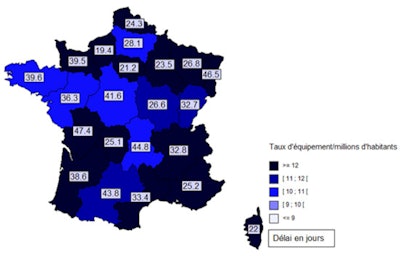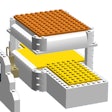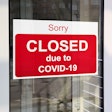
Following publication of the Cemka Eval 2016 survey about MRI waiting times in France, radiologists have voiced fresh concerns about the lack of progress and that the gap between equipment and demand will never be bridged.
"Unfortunately, there is no improvement at all, but no significant deterioration either. The situation is desperately stagnating," Dr. Philippe Soyer, professor and chairman of the radiology department at Hôpital Lariboisière Paris and former general secretary of the Syndicat des Radiologues Hospitaliers (Syndicate of Hospital Radiologists, SRH) told AuntMinnieEurope.com.
The survey conducted by the Cemka Eval Institute shows average waiting times for MRI have increased slightly from 30.3 days in 2015 to 30.6 days in 2016. Even in regions where investment has been made in MRI equipment, the ever-growing application of MRI and disease incidence makes it impossible to cut time-to-exam delays.
 Dr. Yves Menu. Image courtesy of the European Society of Radiology (ESR).
Dr. Yves Menu. Image courtesy of the European Society of Radiology (ESR)."If you look at the waiting times, they have not really changed since 2004, which demonstrates that we are constantly lagging the same distance behind medical advances, not losing ground but not gaining any, either," noted Dr. Yves Menu, a member of the board of directors at Saint-Antoine Hospital in Paris, president of the 2016 Journées Françaises de Radiologie (JFR) congress and president of ECR 2011. "There are so many new indications for MRI. My impression is that we try to improve the situation on the basis that medical science remains stable. Fortunately it does not."
France constantly fails to catch up with the initial gap that was deliberately decided more than 15 years ago in the vain hope of cutting costs, he added.
Long MRI waiting times not only reduce a patient's chances, but also increase his or her mental anguish, according to the sponsors of the survey Imagerie Santé Avenir (Imaging Health Future, ISA), in cooperation with Syndicat National de l'Industrie des Technologies Médicales (National Syndicate of the Medical Technologies Industry, SNITEM).
In a statement, France's Professional Council of French Radiology (Conseil Professionnel de la Radiologie Française, G4) echoed its concern about the results. The group comprises the French Society of Radiology (Société Française de Radiologie, SFR), the Fédération Nationale des Médecins Radiologues (National Union of Private Radiologists, FNMR), the Collège des Enseignants en Radiologie de France (The National College of Radiology Teachers, CERF), and the SHR, which together deplored the lack of means for managing patients in oncology. The FNMR issued a separate statement, noting no progress has been made over the past 12 months.
"The increase in MRI scanners in the last few years still cannot meet the growing demand for this modern technique. How can we seriously envisage properly looking after patients with cancerous pathologies or stroke, with such delays? The FNMR once again solemnly asks the authorities to, for once and for all, take measures allowing all patients equal access to MRI," the federation stated.
Dismal results
The survey about MRI waiting times, published annually for the past 14 years, highlights how current waiting times that hover just above 30 days, lag far behind those envisaged in France's national cancer plan for 2014-2019, which aimed to limit waiting times to 20 days, up from the previous plan's target of 15 days.
| Waiting time for MRI exam since 2004 | |
| Year | Average waiting time (in days) |
| 2004 | 36.1 |
| 2005 | 29.3 |
| 2006 | 33.3 |
| 2007 | 34.3 |
| 2008 | 35.4 |
| 2009 | 34.5 |
| 2010 | 34.6 |
| 2011 | 32.2 |
| 2012 | 29.1 |
| 2013 | 30.5 |
| 2014 | 37.7 |
| 2015 | 30.3 |
| 2016 | 30.6 |
The key methodology used in the survey remains the same: a "patient" with a prescription for an emergency lumbar MRI as part of an investigation for suspected cancer tries to make a date for the exam by telephone across radiology services and centers with MRI in mainland France (700 sites). All exam dates are cancelled immediately afterwards.
More than half of France's population (51.3%) live in a region where delays to MRI are 30 days or more, this percentage having climbed from 43.3% in 2015, the survey revealed. Furthermore, France's MRI scanner numbers are behind the average of other European Union (EU) member states, remaining at 13.1 scanners per million inhabitants compared with 20 per million elsewhere.
Even if some areas have a better equipment rate, like Paris and Provence-Alpes-Côte d'Azur (PACA), waiting times for obtaining MRI have continued to increase even in these regions. "It shows that there are no privileged regions, only underequipped regions, some more deeply than others," Menu said.
Persistent regional disparities
The survey reveals stark regional inequalities: Auvergne, Centre, and Brittany have the lowest scanner numbers and the highest waiting times, respectively 44.8 days, 41.6 days, and 39.6 days. A difference of just over nine days was revealed between average delays in the five least well-equipped (38.2 days) and the five best-equipped regions (29.1 days), according to a statement released by SNITEM highlighting the key points of the survey.
 Delay in days per region for obtaining an MRI in 2016. Colors represent number of MRI units per million inhabitants.
Delay in days per region for obtaining an MRI in 2016. Colors represent number of MRI units per million inhabitants.Furthermore, compared with 2015, waiting times for MRI have increased in 12 regions, five of which have the highest cancer mortality rates: Lower Normandy, Champagne Ardenne, Ile-de-France, Nord-Pas-de- Calais, and PACA. In nine regions, waiting times have increased by 10% (Aquitaine, Auvergne, Basse-Normandie, Limousin, Midi-Pyrénées, Nord-Pas-de-Calais, Poitou Charentes, PACA, and Rhône-Alpes). In Rhône-Alpes, for example, the average delay has leapt from 22.8 days in 2015 to 32.8 days in 2016. Five regions have fewer than 11 scanners per million inhabitants: Auvergne, Brittany, Centre, Picardy, and the Pays de la Loire. In other regions, such as PACA and Nord-Pas-de-Calais, new acquisitions are outpaced by demand, a combination which fails to reduce delays.



















